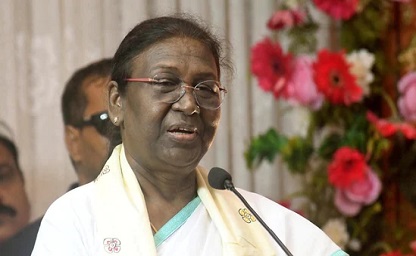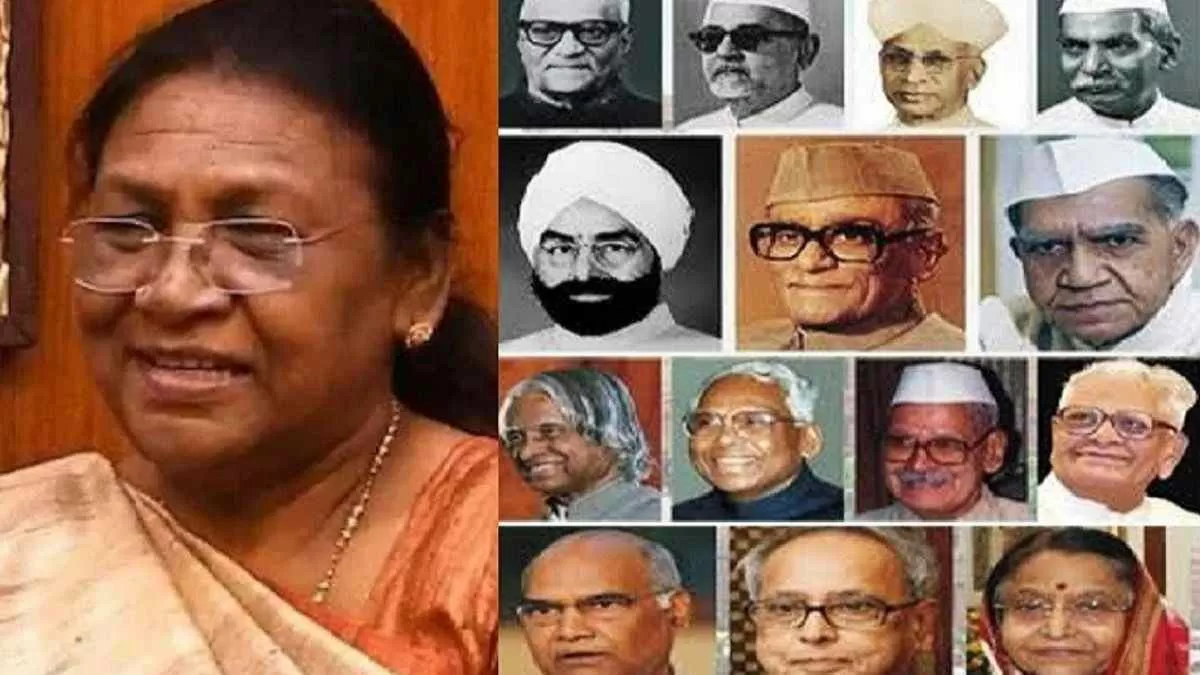List of all Presidents of India from 1947 to 2023: Draupadi Murmu is serving as the 15th President of India and is the first tribal woman to occupy the top constitutional post in the country. With the support extended by various parties, National Democratic Alliance (NDA) candidate Draupadi Murmu, from the start, had a clear edge over the opposition's candidate Yashwant Sinha.
List of Presidents of India (1950- 2023)
The President is the Head of the State in India. He or she is called the first citizen of the country. Article 52 of the Indian Consitution states that there shall be a President of India and as per Article 53, all the executive powers of the Union shall be executed by him or her either directly or through officers subordinates to him.
On 26 November 1949, the Constitution of India was adopted and came into force on 26 January 1950. The first constitutional head of the state, the President of India was Rajendra Prasad.
1. Dr. Rajendra Prasad

Dr. Rajendra Prasad was the first President of India, who had worked as president for two terms. He was also the President of the Constituent Assembly and the Chief Leader of the Indian Independence Movement. He was awarded Bharat Ratna in 1962.
2. Dr. Sarvepalli Radhakrishnan

Dr. Sarvepalli Radhakrishnan was born on 5 September 1888, and this day is celebrated as Teacher's Day. He was awarded Bharat Ratna in 1954.
3. Dr. Zakir Husain

Dr. Zakir Husain became the first Muslim President of India and died at his post. The immediate Vice President, V.V. Giri was made the acting President. After that, Chief Justice of the Supreme Court Mohammad Hidayatullah became acting President from 20 July 1969 to 24 August 1969.
Mohammad Hidayatullah was awarded the Padma Bhushan in the field of art by the Government of India in 2002. He also brought a revolution in education in India.
4. V. V. Giri

V.V Giri was the fourth President of India. His full name was Varahagiri Venkata Giri. He became the only person to be elected President as an independent candidate. In 1975, he was awarded Bharat Ratna.
What is President’s Rule (356)?
5. Fakhruddin Ali Ahmed

Fakhruddin Ali Ahmed was the fifth President of India. He was the second President who died in the post of the President. BD Jattha was made Acting President.
6. Neelam Sanjeeva Reddy

Neelam Sanjeeva Reddy became the sixth President of India. He was the first Chief Minister of Andhra Pradesh. He was directly elected to the post of Lok Sabha speaker and became the youngest President who occupied Rashtrapati Bhavan and contested twice for the post of president.
List of dignitaries allowed to fly the National Flag on their vehicle
7. Giani Zail Singh

Prior to becoming the President, he was also the Chief Minister of Punjab and the Minister at the Centre. He also used Pocket Veto on the Indian Post Office Bill. During his presidency, many incidents took places, such as Operation Blue Star, the assassination of Indira Gandhi, and the 1984 anti-Sikh riots.
8. R. Venkataraman

R. Venkataraman was elected as the President of India from 25 July 1987 to 25 July 1992. Earlier he was Vice-President of India from 1984 to 1987. He has received many honours from different parts of the world. He is a receiver of "Tamra Patra" for his contributions to India's freedom struggle. Besides this, the Russian government had conferred the Soviet Land Prize for writing the travelogue on former Tamil Nadu Prime Minister, Kumaraswami Kamaraj's.
9. Dr. Shankar Dayal Sharma

He was the eighth Vice President of India before becoming president. From 1952 to 1956 he was the Chief Minister of Bhopal and Cabinet Minister from 1956 to 1967. The International Bar Association gave them the 'Living Legend of Law Award of Recognition' due to their multi-achievements in the legal profession.
10. K R Narayanan

K. R. Narayanan was the first Dalit President of India and the first Malayali person to receive the highest office of the country. He was the first President to vote in the Lok Sabha elections and addressed the state assembly.
11. Dr. A.P.J Abdul Kalam

Dr. A. P.J. Abdul Kalam came to be known as ‘Missile Man of India’. He was the first scientist who took over the post of President and the first President of India who won the most votes. In his directorial, Rohini-1 satellites, Agni and Prithvi missiles were successfully launched. The Pokhran-II nuclear tests conducted in India in 1998 after the original nuclear test of 1974 saw him in a pivotal political, organisational and technical role. He was awarded the Bharat Ratna in 1997.
Dr. A.P.J. Abdul Kalam – The Missile Man of India
12. Shrimati Pratibha Singh Patil

She was the Governor of Rajasthan before becoming the President. From 1962 to 1985, she was a member of the Maharashtra Legislative Assembly five times and was elected from Amravati to the Lok Sabha in 1991. Not only this, she was also the first woman president to fly Sukhoi.
13. Pranab Mukherjee

Pranab Mukherjee was the finance minister in the central government before contesting the presidential election. He was awarded the best Parliamentary Award in 1997 and Padma Vibhushan, India's second-highest civilian honour in 2008. He died on 31 August, 2020 (Monday) at the age of 84.
14. Ram Nath Kovind

Source: www.outlookindia.com
Ram Nath Kovind was born on 1 October 1945 in Uttar Pradesh, India. He is an Indian lawyer and politician. He was the 14th and current President of India. He became the President on 25 July 2017 and is a member of the Bhartiya Janata Party. He is the former Governor of Bihar. His approach towards political problems earned him praise across the political spectrum. As a Governor his achievements were the creation of a judicial commission to investigate corruption in universities.
15. Draupadi Murmu

Draupadi Murmu became the 15th President of India on July 21, 2022. Draupadi Murmu was born on June 20, 1958, in Uparbeda village of Mayurbhanj district in Odisha in a Santali tribal family to Biranchi Narayan Tudu. She is a former Governor of Jharkhand. Draupadi Murmu, in 2007, received the Nilkantha Award for the best MLA ( Member of the Legislative Assembly) by Odisha Legislative Assembly.
| No. | Name | Tenure |
| 1 | Rajendra Prasad | 26 January 1950 - 13 May 1962 |
| 2 | Sarvepalli Radhakrishnan | 13 May 1962 – 13 May 1967 |
| 3 | Zakir Hussain | 13 May 1967 – 3 May 1969 |
| – | VV Giri (Acting President) | 3 May 1969 – 20 July 1969 |
| – | Mohammad Hidayatullah (Acting President) | 20 July 1969 to 24 August 1969 |
| 4 | V.V Giri | 24 August 1969 – 24 August 1974 |
| 5 | Fakhruddin Ali Ahmed | 24 August 1974 – 11 February 1977 |
| – | Basappa Danappa Jatti (Acting President) | 11 February 1977 - 25 July 1977 |
| 6 | Neelam Sanjiva Reddy | 25 July 1977 – 25 July 1982 |
| 7 | Giani Zail Singh | 25 July 1982 – 25 July 1987 |
| 8 | R Venkataraman | 25 July 1987 – 25 July 1992 |
| 9 | Shankar Dayal Sharma | 25 July 1992 – 25 July 1997 |
| 10 | K R Narayanan | 25 July 1997 – 25 July 2002 |
| 11 | APJ Abdul Kalam | 25 July 2002 – 25 July 2007 |
| 12 | Pratibha Patil | 25 July 2007 – 25 July 2012 |
| 13 | Pranab Mukherjee | 25 July – 25 July 2017 |
| 14 | Ram Nath Kovind | 25 July 2017 – 21 July 2022 |
| 15 | Draupadi Murmu | 21 July 2022-Incumbent |
President of India: Election and Powers
In the Constitution Part V (The Union) under Chapter, I (The Executive) details of qualifications, election, and impeachment of the President of India are given. That is Articles 52 to 78 in Part V of the Constitution deal with the Union Executive. The President of India is also the head of the executive, legislature, and judiciary of the country.
The President holds office for a tenure of five years from the date on which he enters his office. However, he can resign from his office at any time by addressing the resignation letter to the Vice-President. Further, he can also be removed from office before the completion of his term by the process of impeachment. The President can hold office beyond his term of five years until his successor assumes charge. He is also eligible for re-election to that office.
The Electoral College elects the President of India, which includes the elected members of both the Houses of Parliament, the elected members of the legislative assemblies of the states and the elected members of the legislative assemblies of the Union Territories of Delhi and Puducherry and the representation of its members is preferential. Their vote is single transferable and their second choice is counted too.
Interesting Facts About the President of India
- Only Dr. Rajendra Prasad, India's first president, has served in that capacity for two terms.
- After Zakir Hussain passed away while in office in 1969, V.V. Giri took over as interim president.
- He is still the only individual to have served in those roles simultaneously.
- Three acting presidents have also served as presidents for a brief period of time in addition to a total of fourteen presidents.
- Zakir Husain and Fakhruddin Ali Ahmed, two presidents, passed away while being in office.
- The President of India holds a ceremonial role in the government.
- A president is not elected by the citizens but by the elected members of both houses of Parliament and the elected members of the Legislative Assemblies of States and Union territories.
- Dr. Rajendra Prasad holds the record for being the longest-serving President in Indian history.
- Pratibha Patil, who was elected as the country's 12th President in 2007, is the first woman to hold the position.
Take a look at the following
| List of Prime Ministers of India | List of Chief Ministers of UP |
| Indian Polity & Governance: Complete Study Material | What is the difference between Nationality and Citizenship? |
So, these are the Presidents of India from 1947 to 2022. Take a look at the articles above to enhance your knowledge of the same.
